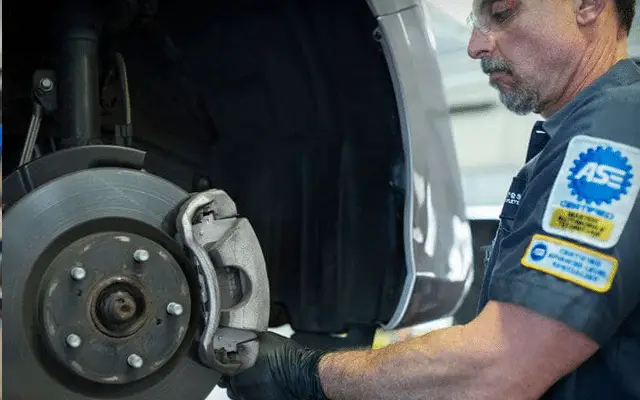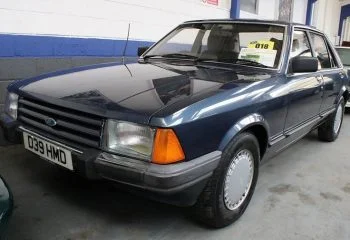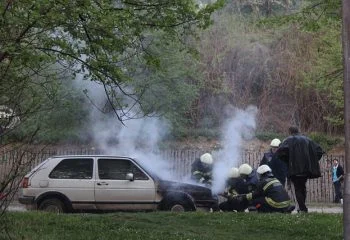It’s quite common to hear a noticeable squeal emanating from your brakes when you back up in your car. The occurrence of this sound can be alarming and cause worry that something is wrong with the vehicle, but more often than not there are several causes for it which can be easily addressed.
In this blog post we will take a closer look at what might be causing the noise and explore various methods to try in order to stop any unwanted screeching from occurring.
What's in this post?
Diagnosing & Fixing Brakes That Squeak When Backing Up
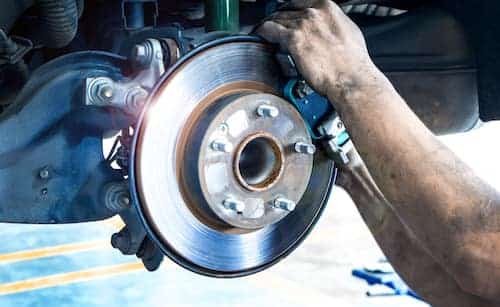
Condensation Moisture, Rain, Or Dew Overnight
When moisture builds up on your brake pads due to overnight dew or condensation, it acts as an abrasive between the pad and rotor. As you back up your car and apply pressure on the brakes, heat is generated as a result of friction between these two components. This causes the water droplets to vaporize into steam, which creates a slight gap between the pad and rotor that generates a loud squeaking noise.
How Can You Stop Your Brakes from Squeaking?
To eliminate this annoying sound from your brakes, you can try several things depending on how much time and effort you are willing to put into it. One option is to purchase wet weather brake pads designed with grooves that deflect water away from the rotor surface. Another solution is periodically wiping down your brakes with an absorbent cloth or rag every few days during periods of heavy rain or foggy mornings.
Finally, lightly pressing on the brake pedal while slowly driving forward may help disperse any extra moisture sitting on top of the rotor surface before applying pressure on them again in reverse motion.
Drum Brakes That Need Lubrication
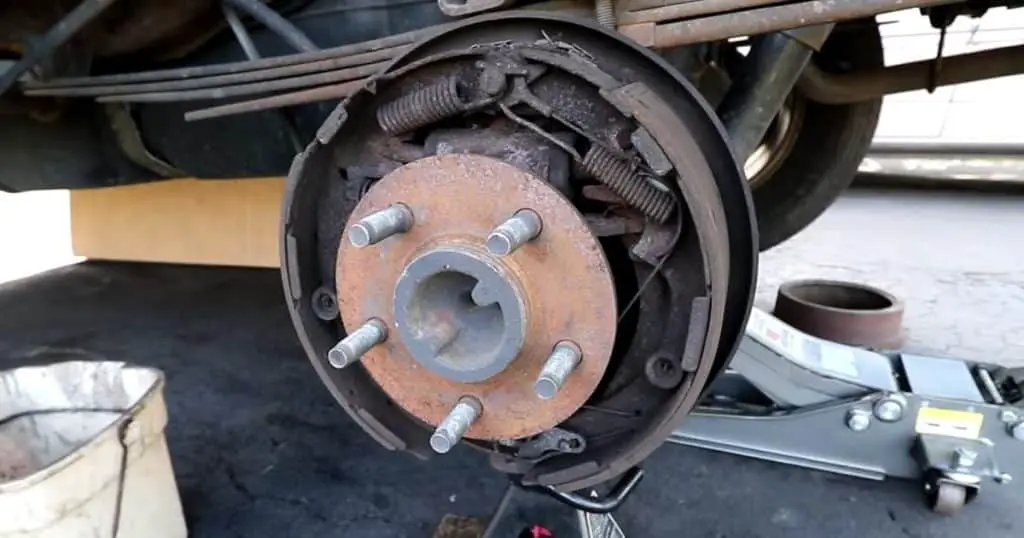
Squeaking drum brakes are caused by dry friction between the brake components. Even though parts may appear greasy on the outside, they could still be lacking proper lubrication deep within their crevices and grooves. This is especially true for older vehicles with worn-out brakes that need servicing more frequently than newer models do.
Lubricating Drum Brakes For Optimal Performance
It’s important to use high-quality grease specifically designed for braking systems when lubricating your drum brakes. This will help reduce friction between moving parts and ensure optimal performance in wet conditions as well as dry ones. As an added bonus, it will also help reduce noise levels associated with braking, resulting in a quieter ride overall.
When servicing your drum brakes, make sure to clean all components thoroughly before applying any type of lubricant or sealant. If possible, remove any rust buildup as well. This will help ensure that all parts are properly protected against corrosion and wear over time while also providing maximum efficiency during braking operations.
Brake Pad Wear
As your brake pads wear down, they become thinner and thinner. Eventually, they reach a point where they are worn too thin to provide adequate protection for your vehicle’s rotors. At this point, the brake wear indicator contacts the rotor and causes a squeaking sound. In most cases, this sound will only occur when you reverse or turn sharply in either direction.
It is important to note that not all vehicles have a brake wear indicator; however, if yours does and it is making noise then it is time for new brakes!
How Can I Fix My Squeaky Brakes?
If your braking system has been squeaking for more than just a few days or weeks then it is recommended that you replace your brakes as soon as possible to ensure proper performance.
The first step in replacing your brakes is to remove the old pads from their calipers; once these are removed you can inspect them for signs of excessive wear or damage such as deep grooves in the friction material or exposed metal backing plates.
Once you have inspected the old pads for any issues you can then install new ones in their place and reattach them to their calipers. It is important to make sure that each pad is seated properly before reinstalling its caliper so as not to cause further damage to other parts of your braking system (such as rotors). Finally, make sure that all bolts/nuts are tightened securely after reinstalling everything!
Low price and metal-rich brake pads
The squeaking sound that occurs when backing up is usually caused by high amounts of metal in the brake pad material rubbing against the rotors when put under pressure. The higher amount of metal causes more friction, resulting in a squeaking or grinding sound. Most modern vehicles are designed with brakes made from softer materials, such as ceramic or semi-metallic, which don’t cause this type of noise.
What Are Your Options?
Most vehicle owners opt for replacements with fewer metal particles, such as ceramic or semi-metallic brake pads. These types of pads are typically more expensive than those with more metal content but they provide quieter braking performance and better wear characteristics over time.
Alternatively, some people choose to simply live with the noise if they don’t mind it. It may not be particularly bothersome during normal driving conditions but could become annoying during certain driving scenarios such as backing out of tight parking spaces or making slow speed maneuvers close to home.
The brake pads are moving slightly in the caliper
Caliper is an essential component of your vehicle’s brake system. It is responsible for stopping your car by pressing the brake pads against the rotor. The caliper contains two or four pistons that press on each side of the rotor when braking.
The pistons move inward when you press on the brakes and outward when they release, allowing the brake fluid to flow back into the master cylinder. When these pistons move too far inward, they can cause the pads to move slightly in their slots, which will cause a squeaking noise when you reverse.
How Can I Fix My Squeaky Brakes?
Fortunately, fixing this problem is relatively simple and straightforward. First, check your caliper bolts; if they are loose or not tightened properly, this could be causing your issue.
Also check for corrosion or rust around those bolts; if there is corrosion present, it may need to be removed before re-tightening them. If there isn’t any corrosion or rust present then simply tighten the bolts until secure; this should solve any squeaking issues caused by loose bolts.
Is there a spray for squeaky brakes?
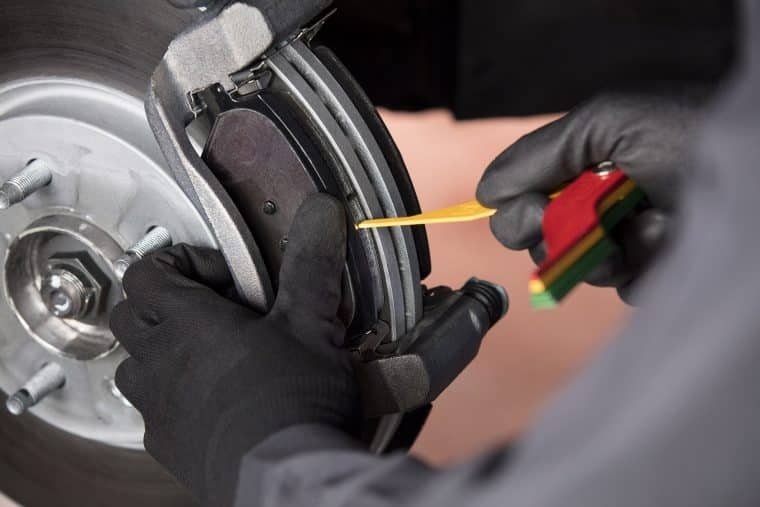
Yes, there are brake cleaners that can help reduce or eliminate the squeak of your brakes. These products generally include a lubricant and/or anti-squeak agents designed to penetrate between brake components, break down dirt and grime build up and help lubricate any moving parts.
Brake cleaner sprays come in aerosol cans or bottles, depending on the brand you choose. To use them correctly it’s important to ensure that all surfaces of your brakes are clean before applying the spray, so they’re covered evenly with product. It also helps if you compress the piston slightly while spraying it onto disc rotors as some air will escape ensuring even coverage.
If done correctly, using a quality brake cleaner product should significantly reduce any squeaking caused by dry pads grating against rotors or other mechanical issues such as rust build up within the brakes themselves. If used regularly these products may act preventively once the initial noise has been dealt with – ensuring everything is kept clean and lubed for great performance without fear of loud squeals when braking.
Conclusion
In conclusion, understanding why your brakes squeak when backing up is important in order to stay safe on the roads. It could be something minor, such as dust and debris accumulatng in the braking components or a sign of impending trouble that needs immediate attention.
Make sure to have them checked by a certified technician who can determine the exact cause of the issue and provide a solution if needed. Aside from that, properly maintain your car and keep up with its scheduled maintenance check-ups to avoid any issues that may arise from your car’s braking system.

